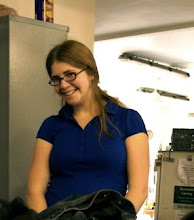Today, Yom Hashoah - Holocaust Remembrance Day, I sat in a class at HUC on the difficult theologies that the Holocaust raises. What was God's role in the Shoah - a perpetrator or a bystander? Does the Shoah require a theological response?
How do I think about this today, on this particular Yom Hashoah? Last night on TV, I watched the state ceremony at Yad Vashem commemorating the day, remembering the 6 million deaths at the hands of the Nazis. I read an
article about whether or not we should draw the Shoah’s lessons out to universal values of eliminating all intolerance. And this morning, I woke up to the news that the U.S. military had killed Osama bin Laden, that Americans were rejoicing in the streets, singing and chanting USA, USA. My first thought: the midrash from Masechet Megillah, that tells us that the angels wanted to sing as the Egyptians drowned in the Sea of Reeds. "In that hour, the ministering angels wished to utter songs of praise before the Holy One, Blessed be God, but God rebuked them, saying: My handiwork, the Egyptians, is drowning in the sea, and you rejoice?!" We are all בני אלוהים
bnei Elohim, children of God, we are all בצלם אלוהים btzelem Elohim, in the image of God, both good and evil. Hitler. Bin Laden. How can we rejoice at more death? Yes, maybe it is good, maybe it is necessary. Perhaps just as the destruction of Pharaoh’s army at ים סוף Yam Suf, the Sea of Reeds, was. But celebration and rejoicing? A verse from Proverbs: בנפל אויבך אל תשמח, ובכשלו אל יגל לבך Do not rejoice when your enemy falls, and do not let your heart be glad when he stumbles (Proverbs 24:17). My friend Evelyn posted on Facebook that she had seen the same images in the days and weeks after 9-11: images of celebration coming out of the Middle East, and America railed in outrage that this was the response of the Arab world.
Yet we also pray, I pray, every day in the Amidah for the eradication of evil in the world:
וכל אויבי עמך מהרה יכרתו והזדים מהרה תעקר ותשבר ותמגר ותכניע במהרה בימינו. ברוך אתה יי שובר אויבים ומכניע זדים.
"...May all Your people's enemies swiftly be cut down. May You swiftly uproot, crush, cast down and humble the arrogant swiftly in our days. Blessed are You, Lord, who destroys enemies and humbles the arrogant. (translation from the Koren Siddur)
Progressive liturgies have adapted the traditional text of this blessing of the Amidah, to reflect the desire to eliminate evilness and badness, rather than evil people.
ולרשעה אל תהי תקווה והתועים אליך ישובו, ומלכות זדון מהרה תשבר. ברוך אתה יי, שובר רשע מן הארץ
"And for wickedness, let there be no hope, and may all the errant return to You, and may the realm of wickedness be shattered. Blessed are You, Adonai, whose will it is that the wicked vanish from the earth." (text and translation from Mishkan T'filah)
Either way – we should rejoice and be grateful when our prayers are fulfilled, no?
As I rapidly clicked through the pictures on the front page of the New York Times this morning, pictures of the crowds in New York and Washington, pictures of President Obama giving his speech, older pictures of bin Laden, and then, unexpectedly…a photo from 10 years ago, of the smoke pouring out of the Twin Towers. And I remembered the fear, and the sadness of that day, and the atmosphere of that Rosh Hashanah.
Today the HUC community stood in silence with the rest of Israel at 10:00am, and remembered the 6 million. Yet there are still questions of how we observe, how we remember – do we focus on the 6 million killed? Do we seek revenge and vengeance against the perpetrators? Do we find
רמזים remezim, hints, of those oppressors from 70 years ago in the world around us, as Prime Minister Netanyahu and President Shimon Peres did last night in their speeches at Yad Vashem? Several years ago, in a Hebrew class at Brandeis, we watched a music video in the days leading up to Yom Hashoah. Miri ben Ari and Subliminal angrily sing the words, at the end of the song:אם יש חיים אחרי המוות, אנחנו נחכה להם שמה
“Im yesh hayyim acharei ha’mavet, n’chakeh lahem shamah.” If there is life after death, we will be waiting for them there.
So how do we respond in the face of tragedy, the tragedies that are inflicted by humanity on ourselves? Do we call for vengeance? How do we find justice amidst this? How do we react when there is justice, yet not peace? President Obama’s speech last night, with its focus on those who were lost on 9-11, and those who have served in the ten long years since then, instead of focusing on triumphalism, reminds me of what today, in the cycle of Jewish time, is truly about. זכרונם לברכה Zichronam livracha – may the memories of all those who have died because of the evil present in our still-broken world be for a blessing.



